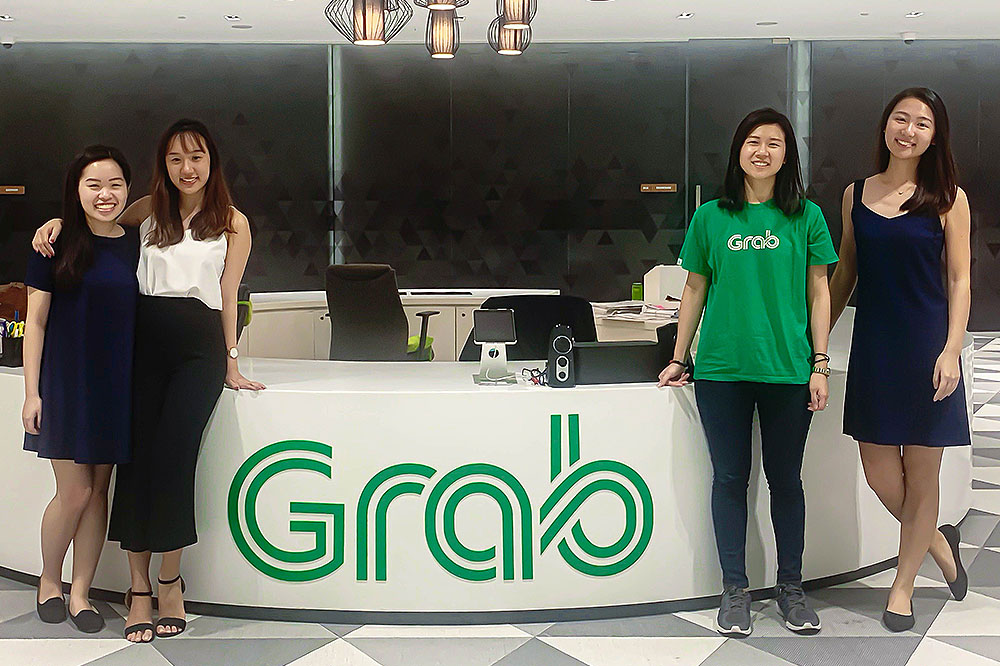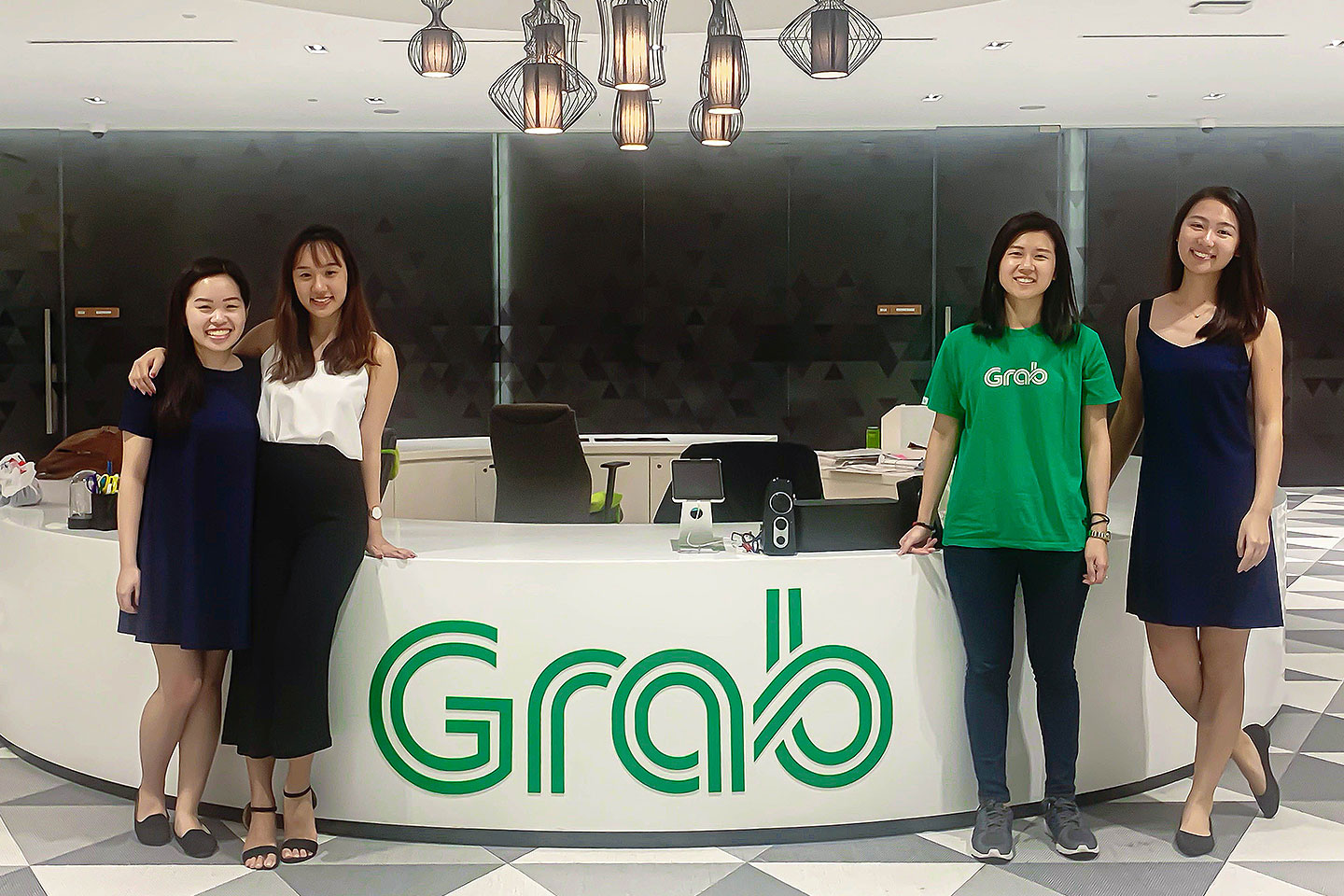Genevieve was an ambitious and inquisitive student in NUS Business School with an insatiable hunger to learn and improve her skills. In NUS, she participated in the NUS Overseas College (NOC) programme in Sweden and worked as a marketing associate in Sqore. Her role included representing Sqore for an overseas trip to Dublin Web Summit in 2014, the largest web conference in Europe with over 22,00 attendees.
Upon graduation, Genevieve joined the Group Audit Division in OCBC, and rose to become a manager. In 2018, she moved to Grab, and is working in the Business Improvement & Automation department. She also represented Grab as a speaker in the 2019 RPA Asia Summit.

Genevieve Leng (second from right), Business Improvement and Automation Consultant, Grab Singapore
Bachelor of Business Administration – Accountancy (2015)
Q: Could you share more about your current role in Grab and yourself to our readers? Do you have a tagline that best represents you?
Currently, I’m in the Business Improvement and Automation department. We tackle inefficiencies in two ways – one is through improving processes, and two is to automate manual processes.
As for myself, my name is Genevieve, and like all of you, I studied in the NUS Business School, majoring in Accountancy. What I am doing now is more related to programming than business or accountancy.
Q: Could you share with us your experience in NUS Overseas College in Stockholm?
It was a rather cold, lonely and depressing experience. The first day I was there, I was so hungry, but I was not sure how to cook. However, I became a Masterchef by the end of the exchange programme!
NOC was a life-changing experience for me, as I felt like an immigrant there. The internship experience allowed me to do things I could not have done in Singapore, such as travelling and working at the same time. During my internship, I was in the marketing department, doing mostly social media advertisements. I highly recommend the NOC programme because the school life is much less stressful as compared to Singapore.
How did you accumulate various work experience or internships prior to your first formal job? What skills developed were you most appreciative of and valued the most and how did they help you once you entered the workforce?
My internship experience started even before I joined the NUS Business School as I was from a polytechnic. The first internship that I took up moulded me a lot as a person. I was thrown into an unfamiliar environment where I had to do VBA programming. I had to do a large amount of research. Through this, I learnt one of the most important skills – Google. Till now, I’m still Googling every day.
Q: Could you share with us more about your role in OCBC? Perhaps, you could run us through day in your life at OCBC bank?
I joined OCBC as an intern before converting into a permanent staff. As an intern, I built the intranet pages for the Group Audit division. I applied for this internship through the business school portal, even though I did not have much experience in this area. My supervisors were very happy with the conversion of the intranet pages from a 90s look into a more modern one, and thus decided to offer me a full-time job. In my new role, I conducted reporting on audit issues for C-level executives and Audit Committee by reading and summarizing many reports. It was a rather repetitive job and hence, I started to automate some of the reportings to make my life easier.
Q: What has been your proudest moment or your greatest achievement in OCBC?
Most banks do not hire many fresh graduates. However, mine was a direct hire and this is rather rare. As the most junior person around, I had to handle a lot of administrative work on top of stakeholder reporting. Every Christmas, I received a lot of presents from my colleagues who were grateful for my help. That was my proudest moment – receiving the appreciation of those that I helped.
Q: What is the difference between audit methodologies & standards and audit analytics?
Audit Methodologies & Standards ensured that the audit department adheres to the Institute of Internal Audit standards in terms of the audit working papers, level of integrity upheld, minimum number of training hours and etc.
Audit Analytics, on the other hand, mainly involved the use of data to conduct audit fieldwork and to implement continuous auditing.
Q: Why did you decide to move to Grab?
Grab opened up a business improvement and automation role, and I felt like my current role in OCBC had helped me to achieve a similar type of skill sets. It was an exciting opportunity and a great decision, as this is something that I’m passionate about.
I believe that human relationships are something that will remain constant even in the future
Q: Was there a steep learning curve and did you have to make any changes to your working style to adapt to the different environments?
Comparing OCBC and Grab, they are on the different end of the spectrum. OCBC is more structured, while Grab was more flexible. The learning curve was the steepest, not in terms of culture but programming, as I come from a non-programming background. For my interview, I actually had a programming test.
In terms of working style, I did have to change and adapt quickly. For instance, there are less layers of approval at Grab, and I was asked to use a messenger application instead of emails to seek for approval, as they were considered too formal. However, with Grab’s rapid expansion, the business culture is becoming more formal and more layers of approval are currently being implemented. Soon, it’ll mirror that of a bank.
Q: What do you enjoy most about your role at Grab?
At Grab, I am situated very close to the heart of the business by being in the operations division. In comparison, audit which is the third line of defence, is very far from the frontline of the business. By working closely with the business owners and through the automation of business processes, I can see tangible business impacts. This is definitely what I enjoy the most about my current role.
Q: To wrap up, can you share some industry trends/ opportunities/ threats ongoing in the industry and how can students leverage on these insights?
In today’s world, change is the norm. Just like how Nokia was once disrupted by Apple, taxi companies today are disrupted by tech companies such as Grab and Uber. Technology is definitely the super big thing right now, with everyone trying to be a co-founder and starting something new. Programming is often labelled as a must-have skill. However, companies are coming up with technology and solutions to replace programmers. Soon, there will be a drag-and-drop concept where anyone can be a programmer, and this, I believe is the future of programming.
Change is inevitable. However, the sole thing that will remain unchanged is humans. Humans need social interaction; they need to talk and feel included. From pagers to payphones to handphones and now smartphones, what is unchanged is that we use all these devices to communicate. Humans are constantly socialising. Hence, I believe that human relationships are something that will remain constant even in the future. Building relationships and learning how to interact well with others is certainly crucial to the success of your future.
The Alumni Spotlight Stories is a weekly series that explores a Bizad alumni’s journey from school to the working world. The story was first published in “Alumni Spotlight Stories: From Student Life to the Peak of your Career” compiled by the NUS Business School Alumni (NUSBSA).




